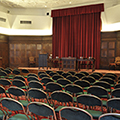


Indroduction et finalité
Pour poursuivre sa finalité la Fondation Universitaire organise régulièrement des rencontres qui permettent d'aborder quelques-uns des défis éthiques inédits auxquels les universitaires sont aujourd'hui confrontés dans leurs diverses fonctions: en tant que chercheurs et en tant qu'enseignants, en tant qu'auteurs ou inventeurs, en tant qu'usagers de bibliothèques ou de banques de données, en tant que consultants, experts ou intervenants dans le débat public, en tant que gestionnaires d'institutions d'enseignement et de recherche. L'objectif est de partager convictions et perplexités, en allant droit aux questions difficiles et controversées, d'une manière qui concilie le souci des valeurs que l'activité universitaire entend servir et la conscience lucide des contraintes dans lesquelles il lui faut opérer.
Initié par la Fondation Universitaire en 2002, le "Forum Éthique" s'est tenu pour la première fois le 21 octobre de la même année. Depuis 2002, le forum se tient chaque année traitant des problèmes relatifs à l'enseignement, à la recherche ou au rôle de l'université envers la société. Des conférenciers des deux communautés ainsi que de la communauté académique internationale contribuent à ces discussions-rencontres. De ce fait, l'anglais est utilisé comme langue de travail. Toute information sur le projet général de l'initiative et sur les activités organisées est donc communiquée en anglais.
Background
The growing internationalization of all scientific communities, the steady expansion of English as their lingua franca, the growing mobility of students and staff, the spectacular spread of computers and the internet, the growing reliance on various types of private funding to supplement public subsidies to research and higher education and, in our country, the gradual "de-pillarization" of society and the near-total decentralization of research and higher education to the Communities as well as European integration and the emergence of Brussels as the capital of the European Union, are so many factors that have profoundly modified the context in which the University Foundation needs to pursue what has been its mission from the start: fostering the advancement of science within Belgium.
An initiative by the University Foundation
In the pursuit of this aim, the hallmark and "added value" of the University Foundation has long been to provide a setting in which scholars from all Belgian Universities could meet, irrespective of their ideological affiliation or mother tongue. True to this spirit but mindful of the deeply altered context sketched above, the University Foundation creates a common forum of discussion on some of the unprecedented ethical challenges - in a broad sense - which academics of diverse fields now face, whether individually or collectively, whether as researchers, as teachers, as supervisors, as authors, as recruiters, as managers, as users of libraries and data banks, as more or less occasional business consultants or policy advisers, or as participants in public controversies. The purpose is to share perplexities and convictions, starting from actual concrete cases drawn from various disciplines, and discussing them in a rigorous way that explicitly combines ethical concerns and awareness of incentives and constraints in the real world of academic institutions and market economies.
The 2025 Ethical Forum
will deal with the question
ACADEMIC FREEDOM UNDER ATTACK - ALSO FROM WITHIN?
and is organized on Thursday 4 December 2025.
Further informaton is published on the website of the Ethical Forum.
More information on the Ethical Forum of a particular year can be accessed by clicking the appropriate item below.
